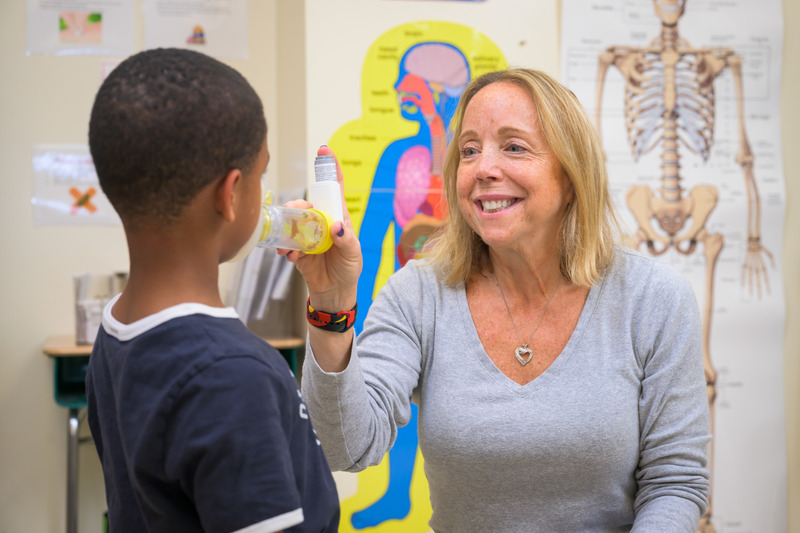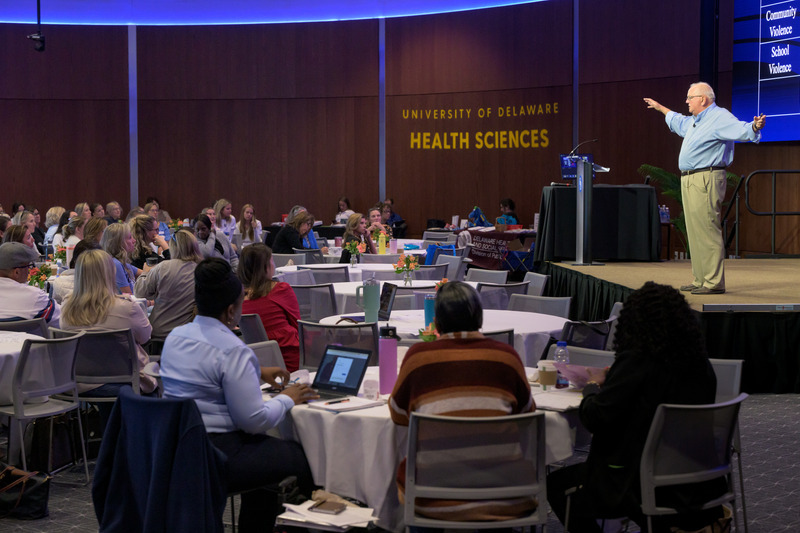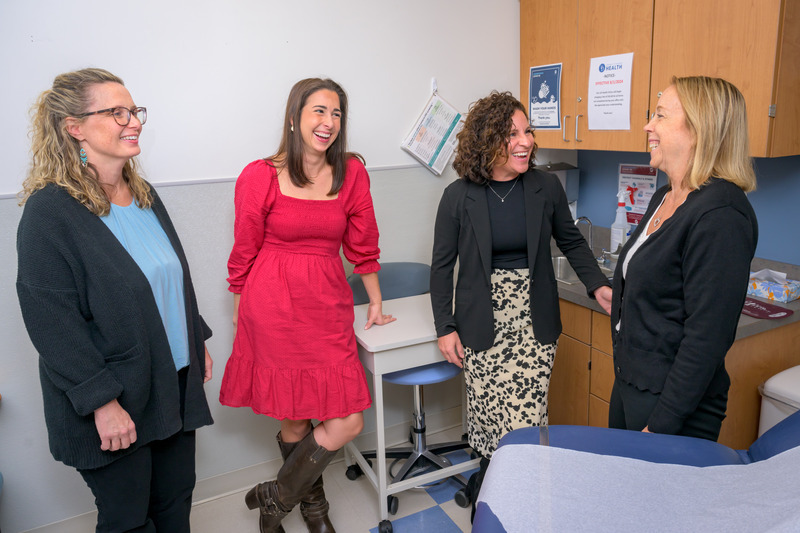


Stronger together
Photos by Evan Krape October 28, 2025
Delaware school nurses unite at UD to find solutions to student mental health crisis
By 11 a.m. on a random Thursday last month, a school nurse in an elementary school had already seen 25 students, spending less than eight minutes with each.
At a high school in Red Clay, a school nurse observed 62 visits in the first four hours of the day, in addition to the 68 scheduled medications dispensed daily.
School nurses say that’s the norm in schools with high behavioral, social and emotional needs, a pattern symptomatic of a rising mental health crisis in Delaware schools.
“Pre-COVID, it did not look like this,” said Mandy Pennington, supervisor of health services for the Red Clay Consolidated School District.
Pennington said they’re seeing anxiety manifest itself as physical symptoms. For example, every Monday, after a long weekend, a kindergartner winds up in the nurse’s office, complaining of a headache.
“Our littlest patients can’t communicate that they’re feeling anxious, so we, as school nurses, have to investigate,” said Pennington. “We first assess their vision and whether they’ve fallen recently. Then, we look at patterns and realize that a headache was a pathway to get this child back to grandma’s house, where she feels more comfortable than being in school.”
These concerns brought hundreds of nurses together for the third annual School Nurse Professional Development Day, held on UD’s STAR Campus on October 10, where they could collaborate, share solutions, and explore strategies to support student health. The partnership between UD’s College of Health Sciences (CHS) and school nurses aims to address pediatric health inequities.

“School nurses play a vital, yet sometimes underappreciated, role in the lives of children,” said Elizabeth Speakman, chief nurse administrator and senior associate dean of the School of Nursing (SON). “You are the backbone of student health – the first responders, the educators, the advocates, and the listeners who ensure that students are safe, healthy, and ready to learn, and we at UD SON are deeply committed to supporting you in this work.”
That spirit of support was echoed by Lauren Covington, assistant professor of nursing, who leads the School Health Initiative for Engagement, Leadership/Learning in Delaware (SHIELD), a working group of school nurses.
“It’s a priority for CHS to advance this work by providing opportunities for school nurses to collaborate and network, raising awareness of the vital role they play, and ensuring they receive the investment they deserve,” Covington said.
On the front lines
Denise Buffin, president of the Delaware School Nurse Association and a school nurse in the Brandywine School District for nearly three decades, sees the impact of the growing mental health crisis first-hand. At Mount Pleasant Elementary, where she works, they contract therapists who provide mental health services to children in school, eliminating the need for parents to take time off work.
But more resources are needed.
“I’d like to see more social workers available for home visits and case management with families,” Buffin said. “Our family crisis therapist works with families at high-risk of entering the Division of Family Services custody, but that limits her caseload.”
Pennington wants two nurses in every school.
“In what other setting are nurses practicing independently at a 1,000-to-one ratio? It’s a well population in theory, but we’re seeing more kids with diabetes, tube feedings, and mental health issues, and having a second provider in every school would help.”
The picture is similar downstate, where Mary Stuart is a school nurse at Mariner Middle School in the Cape Henlopen School District.
“Upstate, there are large hospitals within a short drive for kids. Because it’s more rural here, we don’t have tertiary care, research-based facilities,” said Stuart. “So, the school nurse’s office becomes this catch-all space, where you’re the canary in the coal mine for a student who’s struggling.”
Pennington attributes several factors to the rising mental health needs of students, including COVID-19, social media, and a decline in outdoor activity.
Generation Alpha, students born after 2010, have never known a world without technology. Research shows their constant connection to screens has distanced them from each other, leading to decreased attention spans, diminished social skills, and heightened anxiety.
“Many of the games they play are online; they don’t interact with each other directly,” said Buffin.
Shaping solutions with UD
Pennington, Buffin, and Stuart are part of SHIELD, which meets monthly to identify the main challenges school nurses face, develop solutions, and apply for funding to address these challenges.
These efforts come at a critical time, as school nurses see firsthand how anxiety, depression, and other challenges affect children’s well-being and academic performance.

“School nurses work in silos, and they don’t think about us until they need us,” Buffin said. “Oftentimes, a student’s academic performance isn’t connected with time spent in the school nurse’s office. If these links were made sooner, interventions could be implemented faster.”
Pennington noted that student well-being is closely tied to the adults around them, “If the adults aren’t well, it affects our youth.”
However, through collaboration with UD, school nurses are working not just to treat symptoms, but to shape solutions.
“We must always keep in mind that a student’s mental health affects all aspects of their life, including the severity of illness, their performance in school, and the family system,” said Stuart. “This working group allows us to be evidence-based problem solvers in a protective space.”
As nurses across Delaware face rising student needs, that collaboration has fostered both connection and confidence.
“We are stronger together,” said Pennington. “If we all band as one voice, we can be impactful, and this working group has made nurses feel more empowered to use their voices.”
Contact Us
Have a UDaily story idea?
Contact us at ocm@udel.edu
Members of the press
Contact us at mediarelations@udel.edu or visit the Media Relations website

